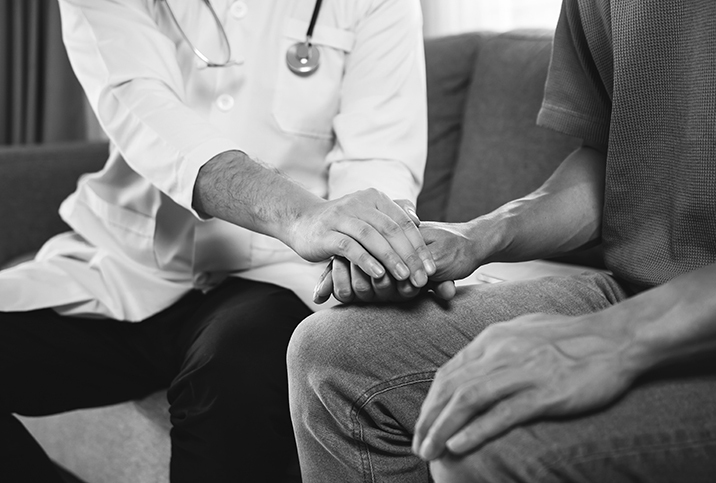Your Testicular Cancer Treatment Method Affects What You Can Expect

Getting a diagnosis of testicular cancer is understandably a frightening moment in a man's life. It's difficult to imagine the tidal wave of emotions that wash over a person in such a position.
However, demystifying the treatment options and what might change in your life after cancer treatment may help reduce anxiety.
Here's a brief overview of treatment types that might be recommended for testicular cancer and how each of them may affect your moving forward.
Surgery
Radical inguinal orchiectomy is the medical term for the surgical treatment almost all men first experience with testicular cancer. And, yes, it means the removal of one or both testicles—there's really no way around this.
That's the bad news. The good news is that if you discover testicular cancer early, this procedure has a tremendous track record. The five-year relative survival rate is 95 percent, according to the National Cancer Institute. Testicular cancer accounts for only 0.1 percent of all cancer deaths, totaling just 440 estimated U.S. deaths for 2021.
The procedure is familiar enough to surgeons that most men go home from the hospital that same day with stitches, minor aches and a handful of mild painkillers.
The other good news is that removing one or even both testicles doesn't spell doom for your sex life: the biggest fear for most guys. With one testicle remaining, you can still get an erection and father a child. And with testosterone supplements, you can still have sex even after the removal of both testicles.
However, if fatherhood is important to you, have a discussion with your doctor about banking some sperm before your procedure, just in case.
For more aggressive, later-stage testicular cancer, another surgery might be necessary: retroperitoneal lymph node dissection (RPLND), or the removal of abdominal lymph nodes. This procedure is more complicated and could require a few days in the hospital, but it may be necessary to prevent the cancer from spreading. The RPLND procedure can sometimes cause damage to the nerves that help you get an erection and may also lead to ejaculatory issues, so discuss these concerns with your medical team in advance.
Chemotherapy
Chemotherapy, or chemo, is the use of drugs to kill cancer cells. Chemo for testicular cancer is usually administered by a vein and is often recommended when cancer has spread outside the testicle. It may also be used to prevent cancer from returning after a testicle has been removed.
Typical short-term side effects include nausea, hair loss, mouth sores, increased chance of infection, diarrhea, fatigue and more, according to the American Cancer Society.
However, some chemo drugs used to treat testicular cancer can cause more serious, long-term side effects including hearing loss and damage to the kidneys, lungs and nerves. Always communicate with your medical team as you undergo treatment because there are ways to alleviate some of these side effects.
Radiation therapy
Radiation therapy is most often used on testicular cancer to destroy cells that have spread to the lymph nodes, usually after an orchiectomy for patients with a seminoma type of cancer.
Radiation treatment is a lot like getting an X-ray. The beam of energy is much stronger and carefully calibrated to attack cancerous cells precisely with minimal damage to the surrounding tissue.
While the procedure itself is painless, side effects can include nausea, fatigue and diarrhea. Fortunately, these effects fade over time after treatment ends, and testicular cancer requires lower radiation doses than other types of cancer.
The radiation oncologist or technician will protect your remaining testicle with a special shield, but radiation treatment may still affect fertility. Other potential long-term effects might include damage to blood vessels or organs near the lymph nodes and in extremely rare cases, increased risk of developing a second cancer elsewhere in the body.
Conclusions
Testicular cancer is one of the most treatable, survivable types of cancer. Not only that, despite the visceral, gut-clenching horror with which most men react when they're not well-informed on the subject, there's no reason a man's sex life should be affected after he recovers.
Check your testicles regularly for lumps, because detecting cancer early is the key to living a long, happy life even after facing testicular cancer.
















